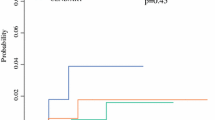Abstract
Background
Axillary dissection omission for sentinel lymph node-negative patients has been a practice at Cancer Institute Hospital, Japanese Foundation for Cancer Research since 2003. We examined the long-term results of omission of axillary dissection in sentinel lymph node-negative patients treated at our hospital, as well as their axillary lymph node recurrence characteristics and outcomes.
Methods
Our study included 2,578 patients with cTis or T1-T3N0M0 primary breast cancer for whom dissection was omitted because they were sentinel lymph node negative. The median observation period was 75 months.
Results
In sentinel lymph node-negative patients for whom dissection was omitted, the rates of axillary lymph node recurrence, distant recurrence, and breast cancer mortality were 0.9, 2, and 1 %, respectively. Eighteen patients underwent additional dissection if axillary lymph node recurrence was observed at the first recurrence. Four triple-negative (TN) patients experienced distant recurrence after additional dissection. All four patients were administered anticancer agents after axillary lymph node recurrence and experienced recurrence within 1 year of additional dissection. The axillary lymph node recurrence rate was 0.8 % for luminal and 4.5 % for TN subtypes.
Conclusions
The long-term prognoses of patients for whom dissection was omitted owing to negative sentinel lymph node metastases were similar to those reported previously—low recurrence and mortality rates. The frequency of axillary lymph node recurrence and the post-recurrence outcome differed between luminal and TN cases, with recurrence being more frequent in patients with the TN subtype. TN patients also had poorer prognoses, even after receiving additional dissection and anticancer agents after recurrence.
Similar content being viewed by others
References
Cabanas RM. An approach for the treatment of penile carcinoma. Cancer. 1977;39:456–66.
Morton DL, Wen DR, Wong JH, Economou JS, Cagle LA, Storm FK, et al. Technical details of intraoperative lymphatic mapping for early stage melanoma. Arch Surg. 1992;127:392–9.
Krag DN, Weaver DL, Alex JC, Fairbank JT. Surgical resection and radiolocalization of the sentinel lymph node in breast cancer using a gamma probe. Surg Oncol. 1993;2:335–9.
Giuliano AE, Kirgan DM, Guenther JM, Morton DL. Lymphatic mapping and sentinel lymphadenectomy for breast cancer. Ann Surg. 1994;220:391–8.
Veronesi U, Paganelli G, Viale G, Luini A, Zurrida S, Galimberti V, et al. Sentinel-lymph-node biopsy as a staging procedure in breast cancer: update of a randomised controlled study. Lancet Oncol. 2006;7:983–90.
Krag DN, Anderson SJ, Julian TB, Brown AM, Harlow SP, Costantino JP, et al. Sentinel-lymph-node resection compared with conventional axillary-lymph-node dissection in clinically node-negative patients with breast cancer: overall survival findings from the NSABP B-32 randomised phase 3 trial. Lancet Oncol. 2010;11:927–33.
Lyman GH, Temin S, Edge SB, Newman LA, Turner RR, Weaver DL, et al. Sentinel lymph node biopsy for patients with early-stage breast cancer: American Society of Clinical Oncology clinical practice guideline update. J Clin Oncol. 2014;32:1365–83.
Japanese Breast Cancer Society. Clinical practice guidelines 2013. Tokyo: Kanehara shuppan; 2013. p. 216–8.
Koizumi M, Nomura E, Yamada Y, Takiguchi T, Makita M, Iwase T, et al. Radioguided sentinel node detection in breast cancer patients: comparison of 99mTc phytate and 99mTc rhenium colloid efficacy. Nucl Med Commun. 2004;25:1031–7.
Koizumi M, Koyama M, Yamashita T, Tada K, Nishimura S, Takahashi K, et al. Experience with intradermal injection and intradermal-plus-deep injection in the radioguided sentinel node biopsy of early breast cancer patients. Eur J Surg Oncol. 2006;32:738–42.
Osako T, Iwase T, Kimura K, Yamashita K, Horii R, Yanagisawa A, et al. Intraoperative molecular assay for sentinel lymph node metastases in early stage breast cancer: a comparative analysis between one-step nucleic acid amplification whole node assay and routine frozen section histology. Cancer. 2011;117:4365–74.
Zavagno G, De Salvo GL, Scalco G, Bozza F, Barutta L, Del Bianco P, et al. A randomized clinical trial on sentinel lymph node biopsy versus axillary lymph node dissection in breast cancer: results of the Sentinella/GIVOM trial. Ann Surg. 2008;247:207–13.
Bulte JP, van Wely BJ, Kasper S, Kuijt G, van den Wildenberg FJ, Strobbe LJ, et al. Long-term follow-up of axillary recurrences after negative sentinel lymph node biopsy: effect on prognosis and survival. Breast Cancer Res Treat. 2013;140:143–9.
NCCN Clinical practice guidelines in oncology. BINV-8, ver 3. 2014.
Pepels MJ, de Boer M, Bult P, van Dijck JA, van Deurzen CH, Menke-Pluymers MB, et al. Regional recurrence in breast cancer patients with sentinel node micrometastases and isolated tumor cells. Ann Surg. 2012;255:116–21.
Conflict of interest
The authors declare that they have no conflict of interest.
Author information
Authors and Affiliations
Corresponding author
About this article
Cite this article
Ogiya, A., Kimura, K., Nakashima, E. et al. Long-term prognoses and outcomes of axillary lymph node recurrence in 2,578 sentinel lymph node-negative patients for whom axillary lymph node dissection was omitted: results from one Japanese hospital. Breast Cancer 23, 318–322 (2016). https://doi.org/10.1007/s12282-014-0576-5
Received:
Accepted:
Published:
Issue Date:
DOI: https://doi.org/10.1007/s12282-014-0576-5




